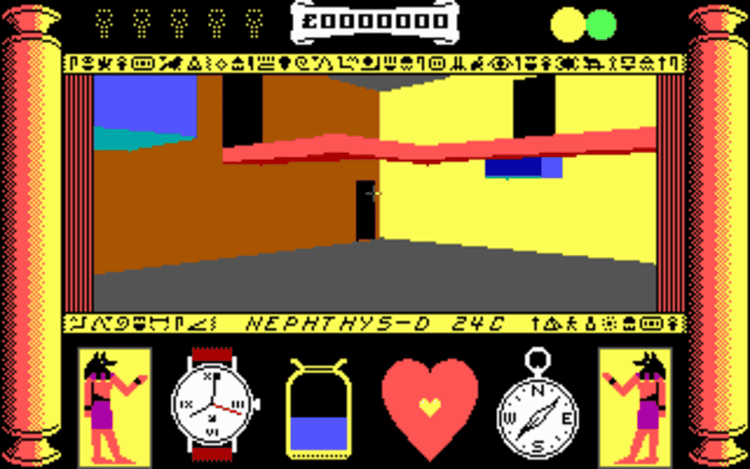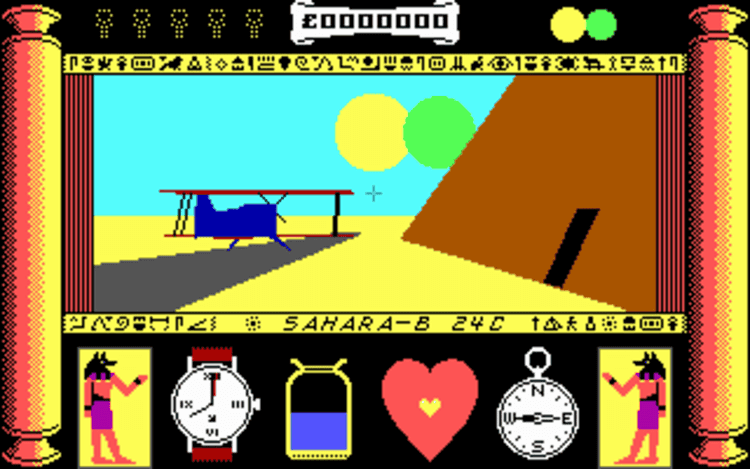
Total Eclipse is a first-person 3D adventure from Major Developments that drops you into a mysterious Egyptian pyramid, racing against a looming eclipse. Built on the pioneering Freescape engine, the game blends exploration, puzzle solving, and light survival elements in a tense countdown. Fans of Driller and Castle Master will feel at home with its methodical pacing and polygonal vistas. Play Total Eclipse online to experience a classic DOS game that rewards careful mapping, smart resource use, and steady nerves as you avoid ancient traps and outwit the curse before darkness falls.
Total Eclipse arrives from Major Developments. Powered by the Freescape engine, it presents a fully navigable first-person world built from clean, flat-shaded polygons. Instead of flipping through static scenes, you move inside a continuous architectural space: turn to examine sightlines, edge along ledges, and read the geometry of rooms to understand how they connect. The setting—a monumental Egyptian pyramid complex wrapped in mystery and threatened by a looming eclipse—frames every choice you make with a tangible sense of urgency.
That historical context matters, because Total Eclipse shows how quickly 3D adventure design matured once true spatial freedom appeared. Earlier adventures emphasized verb lists; this one emphasizes pathways. Major Developments leaned into that shift, giving players a believable place to explore and the tools to interpret it. The result is a game that still feels lucid today, precisely because its challenges arise from geometry, perspective, and pacing rather than brittle logic.
What distinguishes Total Eclipse is the way puzzle structure and time pressure braid together. You are not merely collecting trinkets—you are decoding a constructed environment. Doors respond to concealed mechanisms, inscriptions hint at routes, and hazards demand attention rather than brute force. Rooms rarely exist in isolation. A balcony glimpsed early becomes a destination much later, and a locked panel that once seemed incidental reveals itself as the keystone for an entire wing of the complex. Because the eclipse is advancing, you feel a gentle push to keep moving, yet the best way to progress is often to slow down, observe, and plan.
The pyramid becomes a character in its own right. Corridors rise and dip, chambers offer sightlines that tease unreachable ledges, and hidden niches reward curiosity. Traps are usually telegraphed by the level design—slits in walls suggest darts, angled floors betray sliding stones, and abrupt voids tempt a reckless leap. Resource management plays a quiet role: each detour costs time, and the smartest path is frequently the safest, not the shortest. The resulting flow feels half expedition, half escape, with measured exploration giving way to confident sprints once you understand a floor’s layout.
Total Eclipse encourages the habits that defined early first-person adventures. Mapping pays off. Noting landmarks, counting paces between staircases, and sketching door relationships make the complex intelligible. Freescape’s readable shapes—triangular struts, recessed alcoves, sharp lintels—become mental anchors you’ll use to triangulate position. Because passages interlock, you learn to recognize loops and convert them into shortcuts. When a puzzle spans multiple rooms, your map becomes a living hypothesis you refine with each experiment.
Puzzles rarely ask for obscure trivia. Instead, they prize observation—spotting what aligns, what echoes, what seems intentionally out of place. A blocked route might invite a higher approach; a series of pedestals might correspond to symbols glimpsed two chambers earlier. Satisfaction comes from building a mental model of the structure and then validating it with a decisive action. The eclipse timer heightens decisions without rushing them; you have time to think, but not to wander aimlessly.
Freescape’s flat-shaded geometry gives Total Eclipse a singular identity. Angles read cleanly, silhouettes are crisp, and the minimalist look ages gracefully. Movement is deliberate and weighty, conveying the sense that you occupy a body negotiating stone, sand, and shadow. Interactions are focused: investigate, operate mechanisms, and occasionally take precise actions to neutralize threats that impede progress. Audio is sparse yet purposeful, punctuating exploration with cues that call attention to danger, discovery, or success.
Because the environment is contiguous, moments of verticality stand out. Stairs spiral around shafts, balconies overlook cavernous halls, and ladders link quiet side rooms. The level design understands tempo—tight passages build suspense that opens into larger spaces designed for contemplation. The game rewards patience, but it rarely wastes your time; even apparent dead ends usually teach you something about the pyramid’s structure or hint at a future loop that will send you back through with new purpose.
It is possible to play Total Eclipse online in a modern browser without installing anything, and you can do so entirely for free. The experience is straightforward: launch, explore the pyramid, and let the countdown lend urgency to your decisions. Touch input or a simple on-screen layout allows mobile devices to play the game without restrictions, preserving the deliberate pace and clear readability that suit smaller screens. Whether you return for nostalgia or discover it for the first time, the core adventure remains intact: carefully read the space, choose a route, and act with confidence.
If you have experienced Driller or Castle Master, you will recognize the design DNA: coherent 3D spaces, puzzles rooted in spatial reasoning, and a contemplative rhythm. Total Eclipse adds its own identity with the eclipse timer and the archaeological theme, which together create a focused objective inside a labyrinth. Where some adventures lean on long inventory chains, this one trusts shape, sightline, and structure. That makes it welcoming to newcomers and satisfying for veterans, because the learning curve is tied to skill rather than trivia.
Longevity comes from mastery. On a first run, you will feel the pressure of the countdown as you cautiously test ideas. On later runs, you chart bolder routes, conserve steps, and thread shortcuts you discovered earlier. The pyramid becomes a learned place, and that knowledge turns anxiety into confidence. Few games of the era embrace replay in this way; Total Eclipse does so naturally, inviting you to treat the space like a puzzle box whose secrets can be sequenced ever more efficiently.
Approach the pyramid with an explorer’s mindset. Scan rooms before crossing them, look for symbolic echoes, and question why a platform exists where it does. When you encounter resistive mechanisms, ask what geometry they control and search for viewpoints that reveal linkages. Conserve unnecessary movement by planning a loop that hits multiple objectives in one sweep. If you become stuck, return to the last clear landmark and examine vertical possibilities; many solutions hinge on gaining height or finding an offset path that bypasses a visible barrier.
Performance remains readable even by contemporary standards, which helps the game maintain clarity. The flat-shaded look turns every edge into information, so you rarely lose track of where you came from. The interface stays out of the way, letting the space speak. As the eclipse advances, the best skill you can cultivate is composure: think like an archaeologist, act like an escape artist.
Total Eclipse endures because it distills adventure design to essentials: a convincing place, a pressure mechanism that focuses play, and puzzles born of architecture. Major Developments’ development of a fully explorable polygonal pyramid remains striking, and the Freescape engine’s clarity keeps the challenge fair. In practice, you move forward and back, turn to align with mechanisms, interact with switches or objects, examine inscriptions for clues, and occasionally take careful action to sidestep hazards. The pace is deliberate, the stakes feel earned, and the satisfaction of deciphering the pyramid’s logic never fades.
All used codes are publicly available and the game belongs to its original authors.
Share game
Share game




Share game